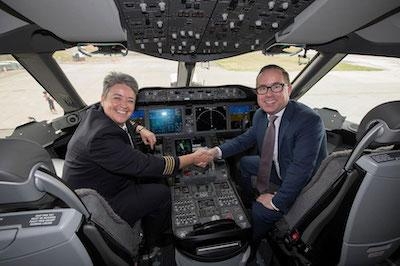On-Board Research To Test Ways Of Improving Wellbeing On Ultra Long-Haul Flights
Qantas has announced three ultra long-haul research flights to gather new data about inflight passenger and crew health and wellbeing.

The flights form part of planning for Project Sunrise – Qantas’ goal to operate regular, non-stop commercial flights from the east coast of Australia (Brisbane, Sydney and Melbourne) to London and New York.
The three flights over three months will use new Boeing 787-9s and re-route their planned delivery flights. Instead of flying empty from Seattle to Australia, the aircraft will simulate two Project Sunrise routes – London and New York to Sydney. This will represent the world’s first flight by a commercial airline direct from New York to Sydney and only the second time a commercial airline has flown direct from London to Sydney.
Each flight will have a maximum of 40 people, including crew, in order to minimise weight and give the necessary fuel range. Carbon emissions from the flights will be fully offset. The on-board research is being designed in partnership with Sydney University’s Charles Perkins Centre and Monash University in conjunction with CRC for Alertness, Safety and Productivity.
People in the cabin – mostly Qantas employees – will be fitted with wearable technology devices and take part in specific experiences at varying stages of the approximately 19 hour flights. Scientists and medical experts from the Charles Perkins Centre will monitor sleep patterns, food and beverage consumption, lighting, physical movement and inflight entertainment to assess impact on health, wellbeing and body clock.
Monash University researchers will work with pilots to record crew melatonin levels before, during and after the flights. Pilots will wear an EEG (electroencephalogram) device that tracks brain wave patterns and monitors alertness. The aim is to establish data to assist in building the optimum work and rest pattern for pilots operating long haul services.
Qantas Group CEO Alan Joyce said the flights will give medical experts the chance to do real-time research that will translate into health and wellbeing benefits. “Ultra-long haul flying presents a lot of common sense questions about the comfort and wellbeing of passengers and crew. These flights are going to provide invaluable data to help answer them.
“For customers, the key will be minimizing jet lag and creating an environment where they are looking forward to a restful, enjoyable flight. For crew, it’s about using scientific research to determine the best opportunities to promote alertness when they are on duty and maximise rest during their down time on these flights," he said.
“Flying non-stop from the East Coast of Australia to London and New York is truly the final frontier in aviation, so we’re determined to do all the groundwork to get this right," Joyce continued. “No airline has done this kind of dedicated research before and we’ll be using the results to help shape the cabin design, inflight service and crew roster patterns for Project Sunrise. We’ll also be looking at how we can use it to improve our existing long-haul flights,” added Mr Joyce.
Qantas has already conducted data on passenger sleep strategies on its direct Perth–London service, and some of these initial findings will be assessed further as part of these dedicated research flights. Customer feedback on food choices, separate stretching and wellbeing zones and entertainment options will also be tested.
Findings on crew wellbeing data will be shared with the Civil Aviation Safety Authority to help inform regulatory requirements associated with ultra-long haul flights.
Airbus and Boeing have both pitched aircraft (A350 and 777X) to Qantas that are capable of operating Project Sunrise flights with a viable commercial payload. A final decision on Project Sunrise – which depends on aircraft economics, regulatory approvals and industrial agreements – is expected by the end of December 2019.
"There’s plenty of enthusiasm for Sunrise, but it’s not a foregone conclusion. This is ultimately a business decision and the economics have to stack up,” Joyce said.
(Image provided with Qantas news release)
 ANN's Daily Aero-Term (12.19.25): Ultrahigh Frequency (UHF)
ANN's Daily Aero-Term (12.19.25): Ultrahigh Frequency (UHF) NTSB Prelim: Cirrus Design Corp SR22T
NTSB Prelim: Cirrus Design Corp SR22T Classic Aero-TV: The Red Tail Project--Carrying the Torch of the Tuskegee Airmen
Classic Aero-TV: The Red Tail Project--Carrying the Torch of the Tuskegee Airmen Aero-News: Quote of the Day (12.19.25)
Aero-News: Quote of the Day (12.19.25) Airborne 12.17.25: Skydiver Hooks Tail, Cooper Rotax Mount, NTSB v NDAA
Airborne 12.17.25: Skydiver Hooks Tail, Cooper Rotax Mount, NTSB v NDAA



